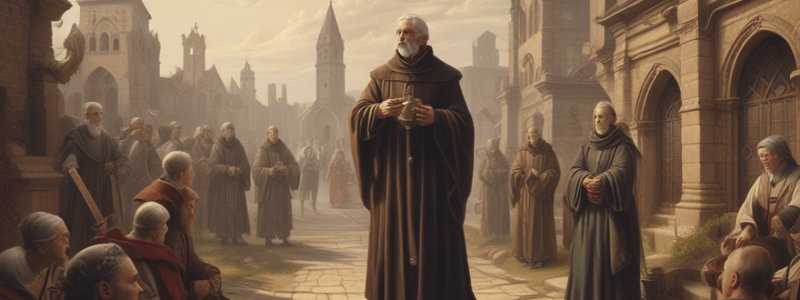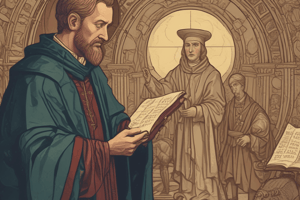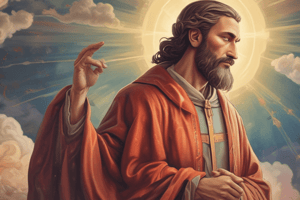Podcast
Questions and Answers
Luther's colleague, Karl Stadt, was a lightweight on the political administrative front.
Luther's colleague, Karl Stadt, was a lightweight on the political administrative front.
False (B)
The mass was abolished during the Reformation in Wittenberg.
The mass was abolished during the Reformation in Wittenberg.
False (B)
Justus Jonas was a notable Catholic theologian and pastor.
Justus Jonas was a notable Catholic theologian and pastor.
False (B)
Luther was not involved in the implementation of the Reformation in Wittenberg.
Luther was not involved in the implementation of the Reformation in Wittenberg.
The Reformation led to a full vernacular liturgy in Wittenberg in 1521.
The Reformation led to a full vernacular liturgy in Wittenberg in 1521.
Conrad Zwilling was a renaissance scholar studying Augustine's thought.
Conrad Zwilling was a renaissance scholar studying Augustine's thought.
The students in Wittenberg did not go on a rampage and smash stained glass windows.
The students in Wittenberg did not go on a rampage and smash stained glass windows.
Philip Melanchthon was senior to Luther on faculty.
Philip Melanchthon was senior to Luther on faculty.
According to Luther, the Holy Spirit can act without the word.
According to Luther, the Holy Spirit can act without the word.
The Zwickau prophets believed that the Bible was necessary for Christian life.
The Zwickau prophets believed that the Bible was necessary for Christian life.
Lutheran churches often have a plain and minimalist aesthetic.
Lutheran churches often have a plain and minimalist aesthetic.
The Reformation significantly disrupted the aesthetics of Christianity from a Lutheran perspective.
The Reformation significantly disrupted the aesthetics of Christianity from a Lutheran perspective.
Melanchthon was initially supportive of the Zwickau prophets.
Melanchthon was initially supportive of the Zwickau prophets.
For Luther, the Holy Spirit is like floodlights to a sporting game.
For Luther, the Holy Spirit is like floodlights to a sporting game.
Karlstadt was a Lutheran priest who wore robes during services.
Karlstadt was a Lutheran priest who wore robes during services.
The concept of 'schwama' is central to Lutheran theology.
The concept of 'schwama' is central to Lutheran theology.
According to Luther, the reform of society is the responsibility of the church.
According to Luther, the reform of society is the responsibility of the church.
Luther's appeal to the German nobility was a radical call to revolution.
Luther's appeal to the German nobility was a radical call to revolution.
Ron Sider's PhD research focused on the theology of Martin Luther.
Ron Sider's PhD research focused on the theology of Martin Luther.
Luther's view of the role of the secular authorities was that they should be obeyed without question.
Luther's view of the role of the secular authorities was that they should be obeyed without question.
Karlstadt's vision of the Reformation involved a more radical transformation of society than Luther's.
Karlstadt's vision of the Reformation involved a more radical transformation of society than Luther's.
Luther believed that God's calling is tied to one's occupation, and that one should not seek to change it.
Luther believed that God's calling is tied to one's occupation, and that one should not seek to change it.
Erasmianism was a more socially conservative movement than Lutheranism.
Erasmianism was a more socially conservative movement than Lutheranism.
Ron Sider's book 'Rich Christians in an Age of Hunger' was a call to social revolution.
Ron Sider's book 'Rich Christians in an Age of Hunger' was a call to social revolution.
According to Luther, the role of the Holy Spirit is to point to the Spirit itself.
According to Luther, the role of the Holy Spirit is to point to the Spirit itself.
Luther believed that the Holy Spirit directly leads people.
Luther believed that the Holy Spirit directly leads people.
The Holy Spirit is essential for understanding scripture according to Luther.
The Holy Spirit is essential for understanding scripture according to Luther.
Luther used the term 'schwama' to describe false prophets.
Luther used the term 'schwama' to describe false prophets.
The Holy Spirit's primary role is to bring attention to itself.
The Holy Spirit's primary role is to bring attention to itself.
Luther viewed the Zvika prophets as a threat to Christianity.
Luther viewed the Zvika prophets as a threat to Christianity.
Luther believed that the Spirit's presence is evident when people talk about the Spirit.
Luther believed that the Spirit's presence is evident when people talk about the Spirit.
Scripture is secondary to the Holy Spirit in Luther's theology.
Scripture is secondary to the Holy Spirit in Luther's theology.
Martin Luther's model of the Reformation was characterized by rapid and drastic changes.
Martin Luther's model of the Reformation was characterized by rapid and drastic changes.
Luther was a fierce-looking knight who often carried a sword.
Luther was a fierce-looking knight who often carried a sword.
The radical side of the Reformation continued even after Luther returned to the Wartburg.
The radical side of the Reformation continued even after Luther returned to the Wartburg.
Luther was interested in disturbing people and causing conflict.
Luther was interested in disturbing people and causing conflict.
Luther was known for his ability to explain complex theological concepts in a simple way.
Luther was known for his ability to explain complex theological concepts in a simple way.
The students in the tavern recognized Luther immediately as the lecturer from Wittenberg University.
The students in the tavern recognized Luther immediately as the lecturer from Wittenberg University.
Luther's approach to the Reformation was characterized by a focus on violent revolution.
Luther's approach to the Reformation was characterized by a focus on violent revolution.
Luther was a skilled warrior who often traveled disguised as a knight.
Luther was a skilled warrior who often traveled disguised as a knight.
Flashcards are hidden until you start studying
Study Notes
Lutheran Church Services
- Lutheran churches have stained glass windows and their priests wear robes, similar to Catholic churches.
- The Reformation did not disrupt the aesthetics of Christianity from a Lutheran perspective.
Karlstadt and Zwilling
- Karlstadt, a sort of professional working-class man, starts dressing as a peasant and orchestrates iconoclastic rioting and the destruction of religious art.
- Zwilling becomes Karlstadt's assistant or "gopher".
The Zwickau Prophets
- Three laypeople from Zwickau, known as the Zwickau prophets, claim to have a direct leading of the Holy Spirit and do not feel the need for the Bible.
- Their theology is a move too far for Melanchthon and Luther.
Luther's View of the Holy Spirit
- For Luther, the Holy Spirit works through the word.
- The Holy Spirit points to Christ, and its role is to focus on Christ, not itself.
The Wittenberg Leadership
- The Wittenberg leadership passes into the hands of Melanchthon, Karlstadt, and Zwilling.
- Melanchthon is a brilliant scholar but lacks administrative experience.
- Karlstadt was Luther's colleague and equal, and Zwilling is Karlstadt's assistant.
Reforms in Wittenberg
- The marriage of clergy is introduced, and the mass is reformed.
- Private masses are abolished, and the liturgy is revised to remove references to the mass as a sacrifice.
- These reforms are implemented by Melanchthon, Karlstadt, and Zwilling.
Luther's Return
- Luther returns to Wittenberg and is disturbed by the increased levels of violence associated with the Reformation.
- He wants to bring about reform peacefully and slowly.
Anecdotes
- Luther is known to roam around Electro-Saxony, and there are anecdotes about him sitting in a tavern, reading a Psalter in Hebrew, and explaining Christ in the Psalms.
Studying That Suits You
Use AI to generate personalized quizzes and flashcards to suit your learning preferences.




